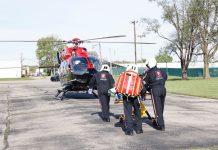Individualized attention and countywide mentoring programs are helping increase graduation rates in both of Bartholomew County’s public school districts, school officials said.
Both districts saw more than 90 percent of students graduate last spring, with 91.4 percent of seniors graduating from Bartholomew Consolidated School Corp. in Columbus and 93.2 percent graduating from Hauser High School in Hope. That’s a 1.6 point year-over-year increase for BCSC and a 5.2 point increase for Hauser.
Each of BCSC’s high schools also made it higher than the 90 percent mark — 92.1 percent of cohorts, or possible graduates, earned their diplomas from Columbus North last spring, and 90.5 percent earned their diplomas from Columbus East.
For North, that’s a 1 point year-over-year improvement, and for East it was a 2.3-point improvement in a year’s time.
[sc:text-divider text-divider-title=”Story continues below gallery” ]
Those rates are higher than the statewide graduation rate, which was down from 89.8 percent in 2014 to 88.9 percent in 2015.
BCSC has been on an upward trend each year since 2011, when 85.5 percent of possible graduates earned their diplomas.
Hauser’s graduation percentage has fluctuated between the mid-80s and the mid-90s over the past five years, with significant fluctuation attribute by school officials to small class sizes.
“One student makes a very large difference for us,” said J.P. Mayer, Hauser principal. “Because we are so small, one student counts as almost 2 percent.”
But the high school’s small size enables teachers to give individualized attention to students who are at a higher risk of not graduating, Mayer said.
Leaders at Columbus high schools said they also try to seek out at-risk students, even though the size of their senior classes are six to nine times larger than their counterpart in Hope.
Here are the numbers of students who graduate within four years at each of the county’s three public high schools, excluding students of special needs who are on a non-diploma track.
At Hauser last year, 55 of a potential 59 students graduated.
At East, 314 of a potential 347 students graduated.
At North, 488 of 530 potential students graduated.
“We have a mantra every year that I work with my teachers on — ‘simply find the one,’” said David Clark, principal of Columbus North. “Find one student that they think might be on the edge and spend extra time with that student.”
Individualized attention at the three traditional Bartholomew County high schools can mean after-school tutoring, special meetings with a guidance counselor or alternative education pathways.
For example, BCSC students who do not think they would thrive in a traditional high school learning environment can apply to Columbus Signature Academy — New Tech campus, where students learn through technology and hands-on projects.
Additionally, the alternative high school program through McDowell Education Center allows students with extenuating life circumstances, such as children or jobs, to complete their education on a schedule that fits their circumstances.
Students who take classes at CSA—New Tech or McDowell are assigned to either North or East and are included in their respective school’s rate.
Offering those alternative education pathways has enabled students who might otherwise consider leaving school to earn their diplomas in a manner that works for them, BCSC superintendent John Quick said.
“Students who would’ve dropped out a decade ago are now graduating with 12 college credits,” Quick said. “That’s a success story.”
Effect of iGrad
The districts also are crediting a large part of their improved graduation rates to the iGrad program.Launched in 2012, the iGrad program is a partnership between Ivy Tech — Columbus, the Community Education Coalition and Cummins, Inc. It provides mentors to students who are at risk of not graduating. The program is open to students in eighth through 12th grade. Nearly 600 students from BCSC middle and high schools and Hauser Junior-Senior High are participating this year.Melanie Wishon, a retired elementary school teacher who is now an iGrad coach at Columbus East, said she has seen the program make the difference between a student dropping out of high school and that student earning their diploma.
“There isn’t any question that iGrad has made a difference,” said Bill Jensen, BCSC assistant superintendent of secondary education.
For Lexi Joyner, an 18-year-old East graduate who finished her classes in December, the iGrad program was the only thing that kept her on track during her final semester of high school.
Although she was a straight-A student, Joyner’s life took an unexpected turn when her mother died last year.
Joyner had planned to graduate high school a full year early by taking classes online, but struggled to keep up with her school work at all following her mom’s death. She missed three months of school, and it seemed as if there was no way she would finish even a semester early.
But when her iGrad coach, Drhea Emberton, intervened last August, things started to turn around.
Emberton visited each of Joyner’s classes to gather her notes and assignments and deliver them to Joyner’s home. She also helped Joyner find online resources and tutorials to guide her through the lessons she missed in class.
With Emberton’s guidance, Joyner was able to complete all of her coursework and finish her required classes in December. She’s now working full time and saving money to enroll in a social work degree program, first at Ivy Tech, and later at Howard University.
But without iGrad, Joyner said there is no way she would be on track to reach her dreams today.
The emotional support Joyner received is sometimes more important to guiding a student toward graduation than academic support, Wishon said.
“Sometimes it’s just being a sounding board for them,” said Wishon, who has been an iGrad coach for almost three years.
When iGrad was established, its creators set a goal of improving the county’s overall graduation rate to 100 percent by 2017.
While that goal is not impossible to reach, education leaders say it would be very difficult to make that jump in just two years.
For now, county educators say they are satisfied with the progress their schools are making to help students earn a diploma.
Top score in A-F
High school graduation rates are one of the categories included in a school’s overall accountability A-F grade, a measurement that is much more reliable than schools’ standardized test scores, Jensen said.Because each of the high schools saw at least 90 percent of students graduating in 2015, they will all receive the best possible score in that category of the A-F grading system when the 2016 grades are released.
District administrators say they plan to continue using their current techniques to continue the upward trend of the graduation rates.
Early intervention and individualized attention are the best methods to meet the needs of at-risk students, the educators said, and the pathways the two districts have made available to their students to provide the resources to complete high school.
[sc:pullout-title pullout-title=”About iGrad” ][sc:pullout-text-begin]
iGrad coaches at Bartholomew County middle and high schools are trained to provide academic and emotional support to students who are struggling to finish school. Students can join iGrad for several reasons, including academic risks, personal struggles or other extenuating circumstances. Based on the situation, a student can be assigned to a tutor or mentor, in addition to their iGrad coach.
The program is sponsored by Cummins, Inc., Ivy Tech – Columbus and the Community Education Coalition.
Resources are available to students in Bartholomew Consolidated School Corp. and Flat Rock – Hawcreek School Corp. For more information, visit igradcolumbus.com
[sc:pullout-text-end][sc:pullout-title pullout-title=”Pull Quote” ][sc:pullout-text-begin]
“Find one student that (teachers) think might be on the edge and spend extra time with that student.”
— David Clark, Columbus North principal
“There isn’t any question that iGrad has made a difference.”
— Bill Jensen, BCSC assistant superintendent of secondary education
[sc:pullout-text-end][sc:pullout-title pullout-title=”At a glance” ][sc:pullout-text-begin]
Mentoring lunch: In celebration of National Mentoring Month, the iGrad program is hosting a lunch at 11:30 a.m. Tuesday at Ivy Tech’s Community Learning Center, 4555 Central Avenue. Current iGrad volunteer mentors, tutors and anyone interested in volunteering are invited to attend.
What mentors do: Work with students in grades 8-12 to help them overcome any barriers that may keep them from graduating.
RSVP to the lunch: Send an email to [email protected] or call 812-374-5265.
Information about iGrad: Visit igradcolumbus.com.
[sc:pullout-text-end]




